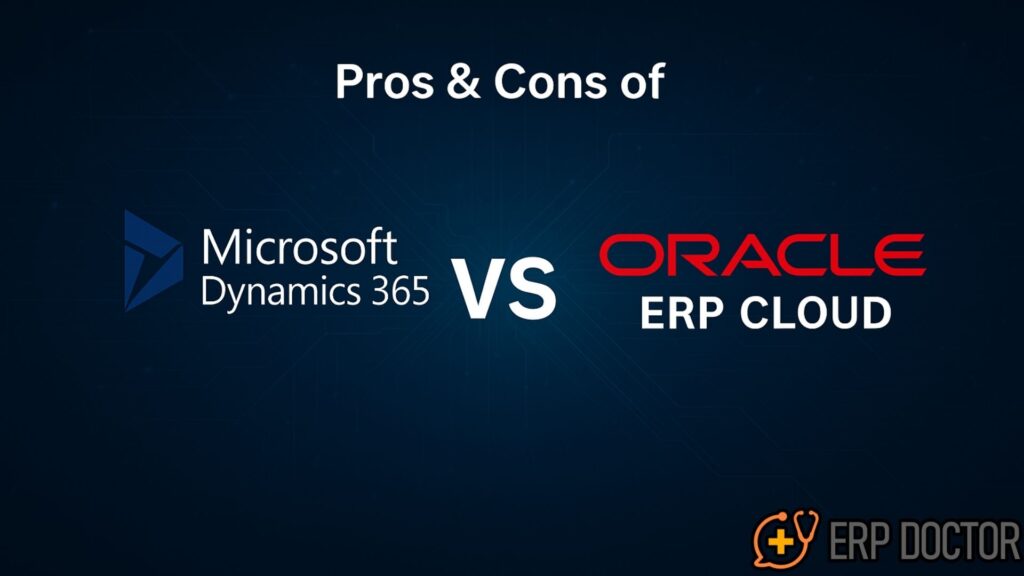
Pros & Cons of Oracle ERP Cloud vs Microsoft Dynamics 365

Oracle ERP Cloud vs Microsoft Dynamics 365: A Pros & Cons Overview
Selecting the right ERP (Enterprise Resource Planning) solution is a critical decision that can impact a company’s operational efficiency, scalability, and long-term growth. Two of the most powerful ERP systems available today are Oracle ERP Cloud and Microsoft Dynamics 365. While both platforms offer a comprehensive suite of features designed to streamline business processes, they cater to different business sizes and industries.
This in-depth guide explores the pros, cons, and key differences between Oracle ERP Cloud and Microsoft Dynamics 365, helping businesses determine which solution best aligns with their goals and operational requirements.
Oracle ERP Cloud vs Microsoft Dynamics 365 – Pros, Cons, and Choosing the Right Solution
To make an informed decision between Oracle ERP Cloud and Microsoft Dynamics 365, businesses must understand their strengths, limitations, and overall suitability for different organizational needs. This comparison covers deployment options, core features, customization capabilities, and industry relevance to help you identify which platform delivers the best value.
🎯 What is Microsoft Dynamics 365?
Microsoft Dynamics 365 is a cloud-based ERP and CRM platform that integrates applications for sales, customer service, finance, supply chain, and business intelligence. Designed with modularity and scalability in mind, Microsoft Dynamics 365 enables organizations to choose the applications they need and expand functionality as their business grows.
✅ Key Features of Microsoft Dynamics 365:
- Seamless integration with Microsoft Office 365, Azure, and Power BI.
- AI-powered insights and predictive analytics for decision-making.
- Comprehensive CRM and ERP capabilities to manage end-to-end business processes.
- Modular solutions that adapt to different business sizes and industries.
- Industry-specific modules for retail, manufacturing, and financial services.
🚀 What is Oracle ERP Cloud?
Oracle ERP Cloud is an advanced, cloud-based ERP platform designed to meet the needs of large enterprises and organizations with complex operational structures. Offering a suite of applications that cover financial management, procurement, project management, and analytics, Oracle ERP Cloud helps businesses optimize processes, manage risks, and enhance operational efficiency.
✅ Key Features of Oracle ERP Cloud:
- Comprehensive financial management, procurement, and project management modules.
- AI and machine learning-powered insights for real-time decision-making.
- High customization and flexibility for complex enterprise operations.
- Advanced analytics and predictive insights for proactive business growth.
- Strong compliance management with industry-specific security standards.
Core Differences
📊 1. Deployment Flexibility
- Microsoft Dynamics 365: Provides multiple deployment options, including on-premise, cloud, and hybrid environments, making it easier for businesses to transition gradually to the cloud.
- Oracle ERP Cloud: Primarily a cloud-based solution designed for enterprises seeking rapid digital transformation, although some legacy on-premise options are available.
📈 2. Target Audience and Industry Suitability
- Microsoft Dynamics 365: Best suited for small, mid-sized, and large enterprises across various industries, including manufacturing, retail, and financial services.
- Oracle ERP Cloud: Designed for large enterprises and complex organizations operating in sectors such as finance, construction, telecommunications, and public sector management.
⚡ 3. Customization and Integration Capabilities
- Microsoft Dynamics 365: Offers highly customizable modules that seamlessly integrate with Microsoft’s ecosystem, including Azure, Office 365, and Power BI.
- Oracle ERP Cloud: Provides extensive customization options but requires specialized expertise to configure complex workflows and maintain the system effectively.
🔎 4. Analytics and Business Intelligence
- Microsoft Dynamics 365: Leverages Power BI to deliver interactive dashboards, advanced analytics, and predictive insights for real-time decision-making.
- Oracle ERP Cloud: Incorporates AI, machine learning, and big data analytics to provide deep insights and automate complex decision-making processes.
💰 5. Pricing and Licensing Models
- Microsoft Dynamics 365: Operates on a modular, pay-as-you-go pricing model, allowing businesses to scale functionality as they grow, making it a cost-effective solution for SMEs.
- Oracle ERP Cloud: Utilizes a bundled pricing structure that caters to enterprise-scale operations, which may lead to higher initial costs but delivers long-term value.
🔄 6. Scalability and Performance
- Microsoft Dynamics 365: Scales well for growing businesses, allowing them to add new modules as operations expand, but may require performance optimization for very large enterprises.
- Oracle ERP Cloud: Built for enterprise-level scalability with high performance, making it suitable for organizations managing global operations and complex workflows.
🔐 7. Security and Compliance Standards
- Microsoft Dynamics 365: Ensures robust security and compliance with global data protection regulations, supported by Microsoft’s reliable infrastructure.
- Oracle ERP Cloud: Offers enterprise-grade security protocols, advanced encryption, and built-in compliance features tailored to highly regulated industries.
✅ Pros and Cons of Microsoft Dynamics 365
🎯 Pros of Microsoft Dynamics 365:
- Flexible, modular pricing with pay-as-you-go options.
- Seamless integration with Microsoft’s ecosystem (Office 365, Azure, Power BI).
- Intuitive user interface that reduces learning curves.
- Scalable solutions that cater to growing businesses.
- Hybrid deployment options for cloud and on-premise flexibility.
❗ Cons of Microsoft Dynamics 365:
- May require additional customization for complex workflows.
- Performance optimization may be needed for very large enterprises.
- Licensing and pricing complexity as business needs evolve.
✅ Pros and Cons of Oracle ERP Cloud
🎯 Pros of Oracle ERP Cloud:
- Advanced AI and machine learning capabilities.
- Ideal for large enterprises with complex operations.
- Strong compliance management with built-in industry standards.
- Real-time analytics and predictive insights for proactive decision-making.
- High scalability for enterprise-level growth and performance.
❗ Cons of Oracle ERP Cloud:
- Higher implementation and operational costs.
- Requires specialized expertise for configuration and maintenance.
- Steeper learning curve for end-users unfamiliar with Oracle systems.
🧐 Which ERP System is Right for Your Business?
✅ When to Choose Microsoft Dynamics 365:
- If your business requires a flexible, cost-effective, and modular ERP solution.
- If you prefer seamless integration with Microsoft applications such as Office 365 and Azure.
- If you’re a small to mid-sized enterprise seeking scalability without complex implementation.
✅ When to Choose Oracle ERP Cloud:
- If your enterprise operates in a highly regulated industry with strict compliance requirements.
- If you need AI-powered analytics and advanced automation to manage complex operations.
- If you’re a large organization with multiple subsidiaries and global operations.
📊 ROI Comparison
📈 ROI Factors for Microsoft Dynamics 365
- Lower upfront investment with modular pricing options.
- Faster time-to-value through seamless integration with Microsoft applications.
- Reduced training time due to familiar interfaces and workflows.
⚡ ROI Factors for Oracle ERP Cloud
- Long-term cost savings through automated processes and predictive insights.
- Enhanced decision-making capabilities with real-time data analytics.
- Strong compliance management, minimizing regulatory risks.
🔥 Final Verdict
Choosing between Oracle ERP Cloud and Microsoft Dynamics 365 depends on the complexity of your business processes, industry requirements, and long-term growth strategy.
For SMEs and mid-sized businesses, Microsoft Dynamics 365 offers a flexible, scalable, and cost-effective solution. On the other hand, Oracle ERP Cloud is best suited for large enterprises with complex operational needs and a demand for advanced AI-powered analytics.
Evaluate your business goals, consider future scalability, and select the ERP platform that aligns best with your organization’s vision for growth.
📚 FAQs
1. What are the main differences between Microsoft Dynamics 365 and Oracle ERP Cloud?
Microsoft Dynamics 365 offers modular, scalable solutions for SMEs, while Oracle ERP Cloud is designed for large enterprises with advanced analytics and compliance features.
2. Which ERP system is easier to implement: Microsoft Dynamics 365 or Oracle ERP Cloud?
Microsoft Dynamics 365 typically has a faster and simpler implementation process, whereas Oracle ERP Cloud requires more extensive configuration for complex workflows.
3. Can Microsoft Dynamics 365 and Oracle ERP Cloud be used together?
No, they are standalone platforms, but businesses can use integration tools to transfer data between the two if needed.
4. Which platform provides better AI and machine learning capabilities?
Oracle ERP Cloud offers more advanced AI and machine learning capabilities, while Microsoft Dynamics 365 provides AI-powered insights through Power BI.
5. Is Microsoft Dynamics 365 more cost-effective for small businesses?
Yes, Microsoft Dynamics 365’s modular pricing model is more cost-effective for SMEs, allowing businesses to scale as needed.
6. Does Oracle ERP Cloud offer better compliance management than Microsoft Dynamics 365?
Yes, Oracle ERP Cloud offers stronger compliance management with built-in industry-specific regulatory standards.
7. Can Microsoft Dynamics 365 support enterprise-level operations like Oracle ERP Cloud?
Microsoft Dynamics 365 can support enterprise operations but may require performance optimization and additional modules for highly complex processes.
8. Which platform has better data security protocols?
Oracle ERP Cloud provides enterprise-grade security protocols, but Microsoft Dynamics 365 also ensures strong security backed by Microsoft’s infrastructure.
9. How long does it take to implement Microsoft Dynamics 365 vs Oracle ERP Cloud?
Microsoft Dynamics 365 typically takes 3-6 months, while Oracle ERP Cloud implementations can take 6-12 months, depending on complexity.
10. Are hybrid deployment options available for both platforms?
Microsoft Dynamics 365 offers hybrid deployment options, whereas Oracle ERP Cloud primarily focuses on cloud-based solutions.







